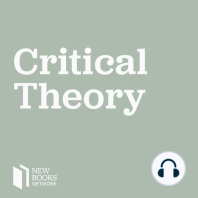71 min listen

Stuart Elden, "Shakespearean Territories" (U Chicago Press, 2018)
Stuart Elden, "Shakespearean Territories" (U Chicago Press, 2018)
ratings:
Length:
43 minutes
Released:
Dec 18, 2020
Format:
Podcast episode
Description
What can Shakespeare tell us about territory, and what can territory tell us about Shakespeare?
In Shakespearean Territories (University of Chicago Press, 2018), Stuart Elden, Professor of Political Theory and Geography at the University of Warwick and author of the Progressive Geographies blog, explores both of these questions, drawing on his earlier work theorising territory, as well as an extensive discussion of numerous works of Shakespeare. The book considers a range of subjects associated with the concept of territory, from the geo-politics of King Lear, the idea of sovereignty in King John, and power in Richard II, to questions of the body in Coriolanus, and ideas of calculation and measurement in The Merchant of Venice. Alongside Shakespeare’s relevance for understanding territory, territory offers a framework for alternative readings of Macbeth and Hamlet, and draws attention to often neglected or even completely ignored parts of Henry V. Fascinating and wide ranging, at the intersection of geography and English literature, the book is essential reading across the humanities and social sciences.
Dave O'Brien is Chancellor's Fellow, Cultural and Creative Industries, at the University of Edinburgh's College of Art.
Learn more about your ad choices. Visit megaphone.fm/adchoices
Support our show by becoming a premium member! https://newbooksnetwork.supportingcast.fm/critical-theory
In Shakespearean Territories (University of Chicago Press, 2018), Stuart Elden, Professor of Political Theory and Geography at the University of Warwick and author of the Progressive Geographies blog, explores both of these questions, drawing on his earlier work theorising territory, as well as an extensive discussion of numerous works of Shakespeare. The book considers a range of subjects associated with the concept of territory, from the geo-politics of King Lear, the idea of sovereignty in King John, and power in Richard II, to questions of the body in Coriolanus, and ideas of calculation and measurement in The Merchant of Venice. Alongside Shakespeare’s relevance for understanding territory, territory offers a framework for alternative readings of Macbeth and Hamlet, and draws attention to often neglected or even completely ignored parts of Henry V. Fascinating and wide ranging, at the intersection of geography and English literature, the book is essential reading across the humanities and social sciences.
Dave O'Brien is Chancellor's Fellow, Cultural and Creative Industries, at the University of Edinburgh's College of Art.
Learn more about your ad choices. Visit megaphone.fm/adchoices
Support our show by becoming a premium member! https://newbooksnetwork.supportingcast.fm/critical-theory
Released:
Dec 18, 2020
Format:
Podcast episode
Titles in the series (100)
Lynne Huffer, “Are the Lips a Grave? A Queer Feminist on the Ethics of Sex” (Columbia University Press, 2013): In her fourth book, Lynne Huffer argues for a restored queer feminism to find new ways of thinking about sex and about ethics. Are the Lips a Grave? A Queer Feminist on the Ethics of Sex (Columbia University Press, by New Books in Critical Theory